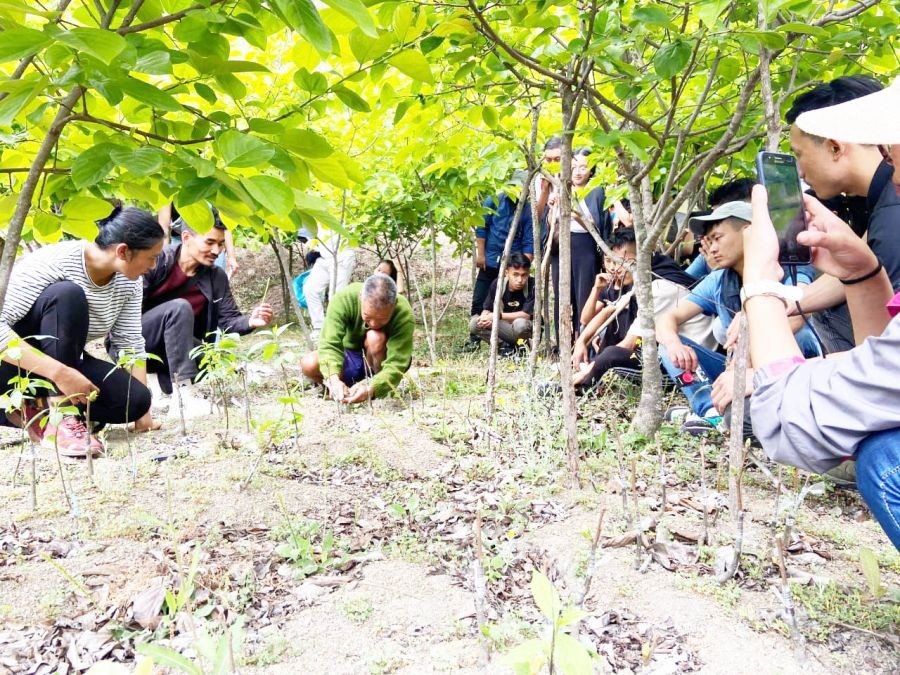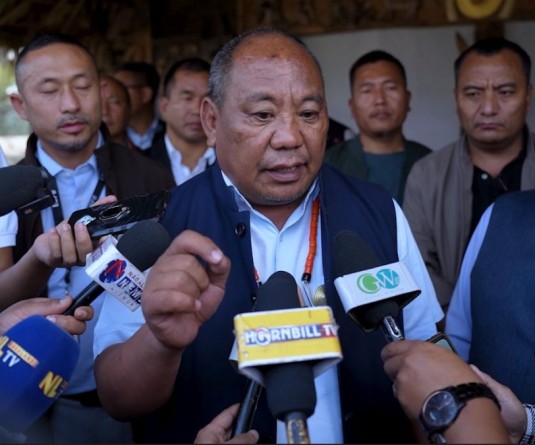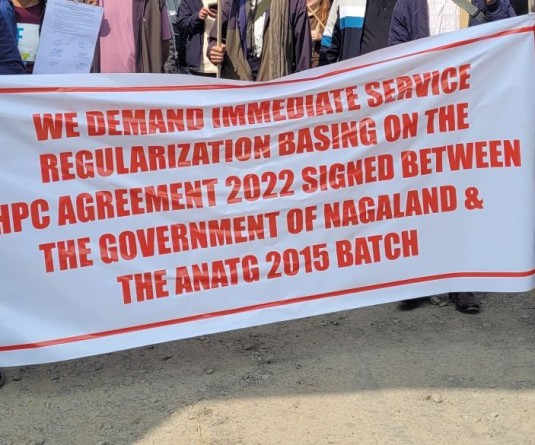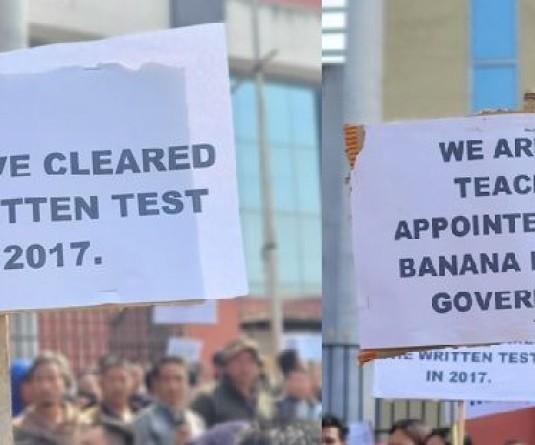Villagers undertake fruit trees plantation under ‘Trees for Wealth.’ (File Photo)

Our Correspondent
Kohima | July 4
The Entrepreneurs Associates (tEA) today shared the success story of ‘Trees for Wealth’ (TfW) movement, which was launched in 2019. tEA’s flagship programme, TfW aims to revolutionize Nagaland’s agricultural landscape, restore environment and to make the state the ‘Fruit hub of India.’
Fruit tree movement
27-year-old Thejozo Kezo dropped out of high school and soon began working as a carpenter in his native village, Khulazu Basa under Phek district. He is part of the TfW movement and has been actively mobilizing farmers from his village. He has planted 150 kiwi plants and 2000 persimmon trees, 30 nectarine, 100 plums, etc under fruit tree plantations movement. Thejozo has high hopes in fruit trees being a source of livelihood and generating income in the coming years.
His interest in the movement has also been fuelled by the Buy Back Policy as well as the trainings and mentorship provided. This year alone till June 22, he has netted about Rs 1.5 lakh from fruit tree saplings alone.
Kepevitono Punyu, a street vendor from Khonoma village used to sell vegetables in Kohima, when the pandemic in 2020 completely disrupted her business.
Under the Pay Back Environmentally Project, she also tried chestnut seeds but encountered failure in chestnut nurseries. She did not give up. She was one of the very few street vendors who enthusiastically participated and raised Tamarillo saplings after chestnut fiasco.
She managed to sell over 4000 Tamarillo saplings getting an income of about Rs 55,000. She paid back environmentally much more than imagined. Individually she has planted more than 200 Tamarillo trees in her backyard, kitchen garden and family homestead with good success.
Sekyuchem Thongru from Tronger village, Tuensang district, was a bus driver before he met with an accident and lost his right arm. When he heard about the initiative of tEA to plant fruit trees, he decided to join in too. Today, he is planting and nurturing Tamarillo and other fruit trees under the TfW movement and in 2021, he had raised Tamarillo saplings worth Rs 25,000.
Buy Back Policy
tEA CEO, Neichute Doulo said that through the movement of TfW a mixed variety of fruit trees like plum, orange, lime, guava, persimmon, avocado, mango, fig, Tamarillo, walnut, pears, litchee, etc., are being introduced including quick yielding fruit trees so that the farmers can harvest early and start earning income to motivate and encourage them to adopt fruit tree plantation as a viable long-term livelihood.
This positive change in mindset is needed to bring about a revolution in the rural land utilization patterns to move away from unsustainable farming methods towards a more sustainable and profitable fruit tree led rural economy.
Tamarillo (Tree tomato) has a GI tag for Nagaland, yet the production level of this fruit is still very low in Nagaland.
Under the TfW Movement over 2 lakh Tamarillo saplings have been planted in 2021, working with over 3500 farmers and it is hoped that this initiative will kick start profitable mass production of Tamarillo in Nagaland. We hope by 2023, there will be huge increased production of this fruit in Nagaland, he said.
With the aim to ensure quick and sustained remuneration for the farmers, intercropping is taken up as part of the movement. Under this initiative various cash crops and spices have been promoted such as potato, perilla, native chillies, turmeric, zingiber ginger/Naga spicy ginger, sesame, Job’s tears, millet, yam, pumpkin, cucumber, tomato, beans and cabbage.
The farmers are familiar with these crops and it is traditionally grown and found to be suitable for the indigenous soil.
Since the crops already have a steady market demand scaling it up is viable and would substantially generate income for farmers. Moreover, it is supported through tEA’s Buy Back Policy to facilitate market linkages for farmers and provide income assurance and risk reduction. So, as they wait for the fruit trees to bear fruit the farmers can earn passive income through intercropping.
“We have been working with different schools, churches and youth clubs by organizing fruit tree plantation drives,” he said adding that concerned with the increasing rate of outmigration of people from rural regions to the urban centres due to paucity of local livelihood opportunities, tEA has initiated the Reverse Urbanization Campaign under TfW movement.
Under the campaign, skills training and awareness drive have been conducted to enhance the capacity of the local population to gain new skills and create opportunities to earn their livelihood and be meaningfully engaged right where they are by planting fruit trees.
Some income generative skills are soap making, baking, pickle and jam making, handicrafts, etc. tEA have trained over 1200 women under this vertical.
Looking forward
By demonstrating a successful fruit tree model of business and showcasing its benefits and viability, we hope people will undertake fruit tree plantation on their own and adopt it on a mass scale, Doulo said.
Already few farmers have planted over a thousand fruit trees after attending tEA trainings. The evidence from the ground since the launch of the movement is very encouraging and insightful regarding the potential as well as the challenges of bringing about attitudinal change and introducing new ideas. Many farmers who have joined the TfW movement to experiment with fruit tree plantations are willing to scale up. However, since it is a new venture, they remain cautious.
In this regard, providing assistance to scale up production and hand-holding support in the initial years of the business is crucial. Provision of training and mentoring farmers on scientific care and modern techniques of horticulture are some need areas for scaling, he said.
Market fluctuations and unforeseen natural calamities remains a risk factor, which tEA is trying to address through its Buy Back Policy and providing credit facilities to enable farmers to meet their urgent needs. In addition, tEA through its social enterprise will develop a Micro Food processing company to create better market facilities for agri produce.
Land use patterns and farming methods remains a challenge in rural settings, while recognizing that traditional practices and set customs requires time to change, tEA is confident that by demonstrating a successful and feasible model of fruit tree orchards, a positive shift can take place in the overall rural farming landscape of Nagaland and usher in a transformation of the local economy. Advocating and lobbying for fruit tree plantations by community, government and Civil society organisations for wide scale economic prosperity and restoring environment will make Nagaland to become the ‘fruit hub of India.’
The TfW is an innovation to work with what we have–land, labour and minimum capital and trigger a Rs 1 trillion local economies without being dependent on the government.
“We hope that planting 1 billion fruit trees will add value to reverse climate change. It will make NER India and north western region of Myanmar to truly take advantage of being the 6th hotspots of the World’s biodiversity, by adopting mass fruit trees plantations. ‘Micro by One, Volume by mass’ where 1 million farmers and individuals on an average planting 1000 fruit trees will indeed lead to 1 billion fruit trees,” he said.






